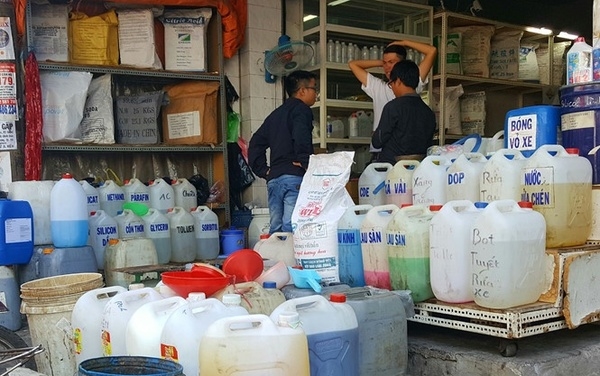 Op-Ed
Op-Ed

The images from a video clip of two young girls falling on the road and screaming in pain for help after being attacked with acid by two male strangers on March 30 in HCM City.
 |
| A shop selling chemicals at Kim Biên Market in HCM City. Two young girls recently were attacked with acid by two male strangers on March 30 in HCM City’s Gò Vấp District has caused panic over the past week.— Photo thanhnien.vn |
By Khánh Linh
The images from a video clip of two young girls falling on the road and screaming in pain for help after being attacked with acid by two male strangers on March 30 in HCM City’s Gò Vấp District has caused panic over the past week.
The police quickly began an investigation. The reason for the attack, like most acid attacks in Việt Nam, is a form of revenge on a former girlfriend who ended a romantic relationship with the perpetrator.
Three suspects behind the attack have been arrested. They will surely be put behind bars for what they’ve done. But the two victims, one of whom is now blind in one eye and has been scarred over 70 per cent of her face, will be forced to live with physical and psychological reminders for the rest of their lives.
Such stories sometimes occur on the first page of local newspapers. No official statistics on acid attacks have been revealed so far, but in 2015 alone, at least seven acid attacks were reported in the news.
In Việt Nam, acid seems to be a favourite weapons of perpetrators for revenge. It’s easy to realise that most acid victims are women, whose faults can simply be a rejected marriage proposal or a romantic relationship with a man they don’t fancy.
For perpetrators, to attack a victim’s head and face is the most effective way to ruin their lives. Most victims survive the attack, but they must live with blindness and lifelong scarring of their face and body.
Vũ Thị Hà, a 19-year-old in HCM City’s Long Trường Ward, said her life ended when a whole bottle of acid was thrown on her face last October.
The fiery liquid flowed down her head and neck, burning and scarring most of her face. She has undergone three reconstructive operations, but doctors could not save her one eye.
Scars on her face have healed, but Hà is tormented with burning sensations on hot days.
“I feel scared whenever I see myself in the mirror,” she said. “My mother burnt all my old photos. Looking at them, I only think of death.”
Her ex-boyfriend, the perpetrator, was sentenced to three years in jail.
Undoubtedly, throwing acid on women is one of the cruelest crimes, changing the woman’s life in an irreversible way. The victims have their beauty, mental and physical health ruined, and even are forced to depend on their families for basic daily needs.
However, as the current Criminal Law regulates, the crime is listed as ‘causing injury intentionally’ and offenders are sentenced 20 years in jail at the most.
For offenders, they still have a future waiting for them. They can live a better life after being in jail. For the survivors, especially female victims, the future is the most cruel and horrific thing – even worse than death.
In many cases, police can’t bring attackers to justice, as there are no leads.
Meanwhile, the fatal weapon can easily be found at the market. On the Ministry of Industry and Trade’s list of the most toxic acids with high lethality, sulfuric acid is available from motorbike repair shops and chemical shops in big cities at the price of dozens of thousands of đồng per litre.
With just a click of the mouse, a large amount of the substance will be delivered to buyers without any licence or legal papers recording their personal information and usage purposes.
Under the loose management of acid sales and light penalties for offenders, acid attacks will continue to happen. Vietnamese women will always feel unprotected while they’re out.
After the video clip was posted on social websites and online newspapers, many legal experts have proposed the highest penalty for attackers as an effective way of deterring those who intend to commit the crime.
In other countries where acid attacks have long plagued women, such as Bangladesh and Pakistan, the number of acid assaults have fell since stiffer penalties were introduced. In Bangladesh, this number has fallen from 492 cases in 2002 to 75 last year since its government applied the highest punishment - the death penalty. Tougher legislation in Pakistan has helped increase the number of women coming to report the crime by 300 per cent.
The girl who lost one eye in the acid attack on the video clip might no longer see the world completely, the way she used to. To assure no other Vietnamese women face the same fate, a campaign to crack down on the sale of acid and stiffer legislation for those convicted must be promptly implemented.
People should be aware of the consequences they will face when they think of ruining a person’s life with a can of acid. — VNS